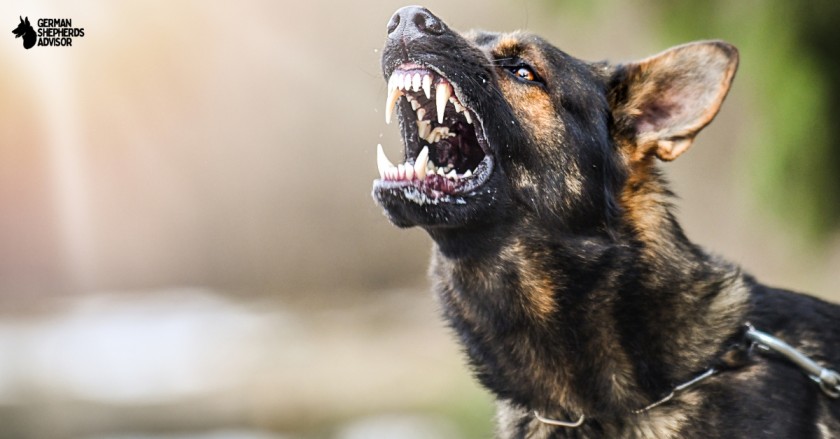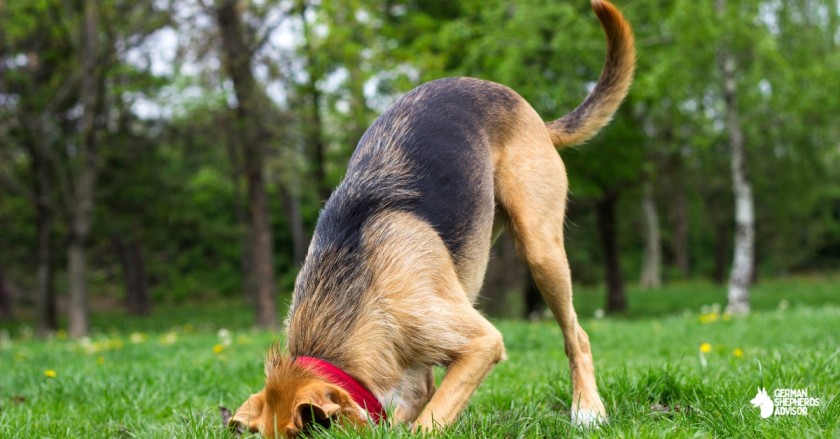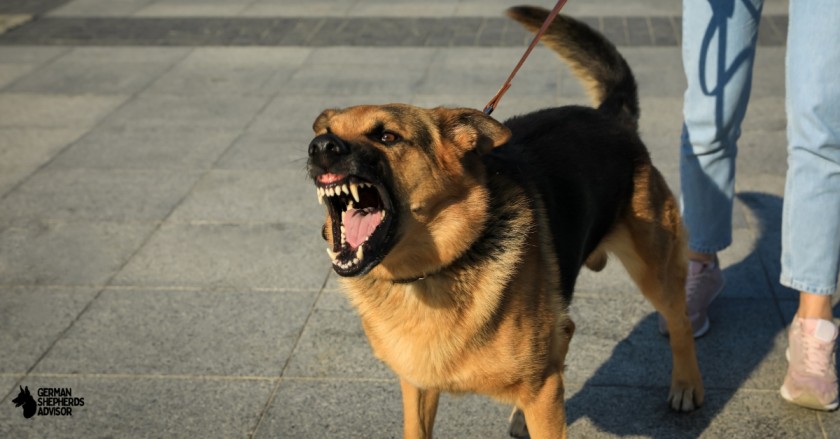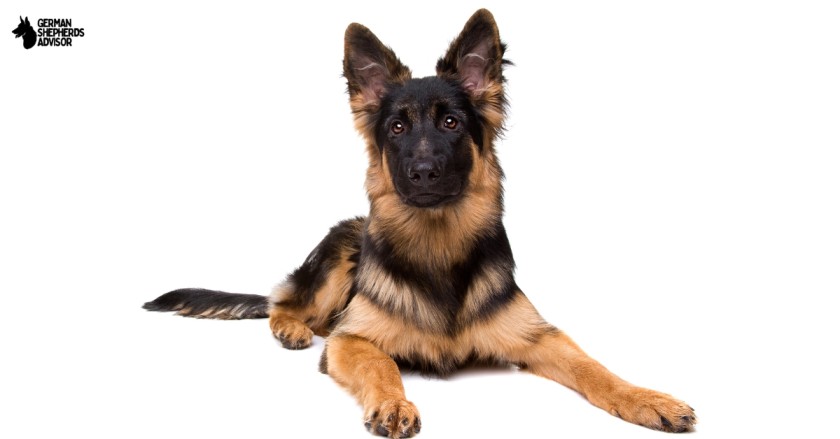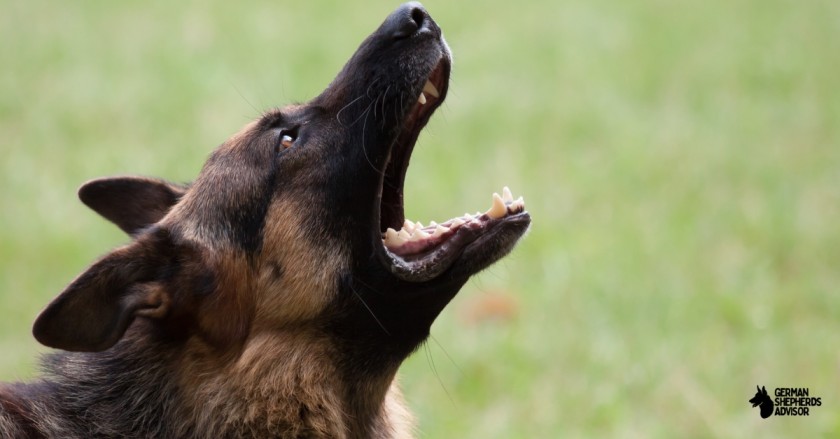Why are German Shepherds aggressive? And why do they get labeled as a dangerous breed of dogs?
Background
German Shepherds have been bred to be the perfect working dog. They were originally from Germany and used for herding sheep, protecting their owners flocks from predators and strangers, and intimidating any people who would try to steal a farmer’s flock. In order to accomplish these tasks it was necessary for German Shepherds to have very powerful jaws, extreme loyalty towards their owners, and fearlessness in the face of strange people or animals. These things still carry over into today’s living rooms.
The stereotype that all German Shepherds are mean is largely unfounded, but there is no denying that some dogs live up to the reputation while others do not.
While some German Shepherds live as family pets and never display aggressive behavior, others can become very dangerous or unpredictable if they are not properly trained and socialized at a young age. The good news is that any dog can be trained to behave well in certain situations, if their owners know how to go about it right. Unfortunately, many people believe that a large breed of dog will protect them on its own with no training whatsoever, which is a huge mistake unless the owner is planning on being gone from home all day long so they have plenty of time to spend with their pet every day training it.
Aggression problems don’t happen overnight. In fact many behavioral problems take years of neglect before they start showing up for everyone to see. The longer a dog has to live with an owner who trains it incorrectly or doesn’t train it at all, the worse its behavior problems are going to be when they finally start showing up.
How can you recognize aggression in your German Shepherd?
Here are some warning signs that your dog is about to become dangerous:
– Towards other dogs/strange dogs – Baring their teeth, growling, chasing, snapping, etc.
– Towards children – Snapping, biting etc.
– Towards owners – Growling, baring teeth etc.
If your dog displays any of these behaviors frequently then there is a problem which needs to be addressed as soon as possible before something bad happens. While some aggressive dogs may never snap or bite without warning, many others will and some even do it as a result of something as little as a loud noise or someone accidentally stepping on their paw.
One reason why German Shepherds are aggressive is simply because they were bred to be extremely loyal to their owners and very protective. If your dog feels like you or another person is being threatened then it may feel the need to take immediate action and protect its owner, no matter what the risk. This can cause them to attack people who seem suspicious, children who run around and play loudly, etc. There isn’t necessarily anything wrong with your dog’s behavior if this happens, but instead there is something wrong with how you have trained it. Dogs don’t think for themselves; they merely act on what they have been taught.
Training
If you train your German Shepherd to be aggressive or protective, then it is very likely that this behavior will carry over into other areas of its life. This is why many people who own aggressive dogs are also the victims of dog bites themselves. They aren’t aware of any warning signs their dog may display when around strangers, children, etc., and these strangers in turn are afraid of their pet. A perfect recipe for disaster waiting to happen.

Furthermore if you don’t socialize your young puppy with enough different people, animals, situations and environments while it is still young then it will never develop a true sense of confidence around anything but you.
Some dogs are naturally more shy than others so they need a little more socializing as well. But if your dog is naturally aggressive, then there isn’t really anything you can do to change its behavior without professional help. And if this is the case, it might be a good idea to re-home your pet and find it a new owner who knows how to properly deal with aggressive dogs.
What can I do to stop my German Shepherd’s aggression towards other dogs?
A: Aggression between dogs is highly treatable. The earlier you intervene and use proper management and treatment, the less likely future problems will occur.
I recommend an aggressive dog first be examined by a veterinarian to rule out possible health issues that may cause or contribute to the behavior. Once all medical causes have been ruled out and we can safely assume that at least some of this aggression is caused by fear or anxiety, then behavior modification training should begin as soon as possible.
I recommend working with two trainers for this, one to work on desensitization and counter-conditioning of your dog’s reaction to another dog (including helping you walk him safely) and a second trainer to work on the dog-to-dog aggression. In general, people find it easier to work with one person for training and another for behavior modification, but if the behavior modification expert is also an experienced dog trainer you may be able to get away with working with just one person.
However you do it, I recommend that you use a strict management protocol in which your German Shepherd must be safely confined when he cannot be directly supervised by a human. Confinement does not have to mean crating or tethering, although these methods are effective for many dogs. Confinement can also involve using a baby gate or exercise pen (sturdy ones like those found at Petco or other pet stores) or simply choosing areas where your dog will be safe (such as underneath a table) and blocking him from access to those areas.
Behavioral check
The next step is teaching your GSD the behaviors you WANT him to exhibit instead of the ones you don’t want. For example, if your dog lunges and barks at other dogs when on leash, you need to teach him that good things happen when he sees another dog and that he can continue looking around for other interesting things or people after he’s seen the dog rather than barking and lunging at it. This is done through training an incompatible behavior such as focusing on you for a treat for as long as possible before the other dog passes by. In addition, I highly recommend using a head halter such as an EZ-Walk or a Halti to give you better control over your dog and more quickly communicate with him so you can interrupt and reward desirable behaviors.
For example, if he sees another dog and begins acting anxious/lunging/barking, you should immediately fit the halter (which he will probably try to remove at first) and use treats as well as verbal praise (and even tug games) for keeping his attention focused on your face, thus showing him that not looking at other dogs is actually fun. At first, the amount of time the behavior needs to be performed before getting reinforced (paying with a treat or social interaction such as petting or play) should be very short – only one second. When your German Shepherd can stay looking at you for several seconds, start increasing the length of time he must look at you before getting reinforced.
As your dog’s skills improve, so should the criteria. For example, if he begins to show interest in the other dog but still is showing some anxiety when it gets close (perhaps beginning to growl or bark), then when he can remain focused on your face for 5-10 seconds with the other dog about 30 feet away (and his behavior remains appropriate for that distance) then progress to having another person with a calm friendly dog come closer while you continue reinforcing him for focusing on you rather than looking at the other dog.
Similarly, if he does well when they are both 50 feet away and one person is holding each dog, then progress to having the dogs walk by you when they are 30 feet away and one person is holding each dog. Work up to them passing by at 10-20 feet with two people controlling the dogs in some way.
For more information on this topic, including lots of photos showing how different body postures and haltering techniques can influence your GSD’s behavior, please see my article “Counter-Conditioning Your Dog to Enjoy Seeing Other Dogs.”
If your GSD continues to struggle when another dog gets closer than 30 feet or so (or if his behavior deteriorates rather than improves when another dog gets close), then I recommend that you do two things:
1) hire an experienced force-free trainer who uses positive reward-based methods to help you learn how to better manage your dog’s behavior when he sees other dogs and knows how to effectively use positive training techniques with him. Just the presence of an experienced trainer will be enough for some dogs who are struggling, so you won’t even need to work on things with your dog in the presence of another one.
2) Alternatively, you may want to enroll him in a class designed specifically for helping reactive/aggressive dogs where both you and your GSD can get individualized attention from an instructor or assistants while socializing safely with other friendly, well-controlled dogs.
Such specialized classes are offered at many facilities including some traditional training centers as well as veterinary teaching (UC Davis even has a miniature horse who is a certified therapy animal and does brief sessions with nervous dogs).
Endurance
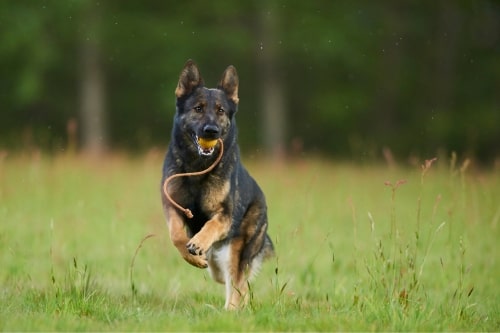
You should also work on helping your GSD develop better tolerance for things that may startle or scare him such as umbrellas opening and other noises and movement, people in costumes (super heroes, clowns), people herding sheep like at a Renaissance Faire (if you can find one where the herder is willing to let your GSD walk by while he’s doing his job), etc. Have friends or family members practice opening and closing doors loudly while you feed your German Shepherd treats. Make these events predict wonderful things for him so they will not become associated with anything unpleasant.
In addition, make sure that your dog always has an appropriate outlet for taking out his energy and emotions such as physical exercise, mental exercise (food puzzles), training, etc.
If your German Shepherd has been diagnosed with canine cognitive dysfunction (doggie Alzheimer’s) or a similar problem affecting his brain function then you should definitely do the things described above but I would be more cautious about allowing him to meet and greet other dogs. Even if he seems perfectly normal in all other ways, this is a sign of a possible change in his brain chemistry that may cause him to behave inappropriately around others at any time. It might be very appropriate for him to play with one dog today but tomorrow it could result in a fight so please use good judgment when deciding whether it’s safe for your G to socialize with other dogs.
Are German Shepherds aggressive to strangers?
A new study suggests that German Shepherds are more aggressive to strangers than other breeds.
Researchers in the US compared how much seven different dog breeds bit strangers and their owners. They found that when it came to biting, German shepherds were by far the worst offenders. The study – carried out by researchers at the University of Pennsylvania in Philadelphia – looked at attacks on passers-by in 10 cities around America over a six-year period (ScienceDaily).
Renowned animal behaviorist Dr Sophia Yin has this advice for potential GSD adopters: “Any time you adopt any pet, whether it is from an animal shelter or anywhere else, take into consideration that your pet will be interacting with people outside your family. If you have any concerns about aggression, take your dog to an animal behavior specialist for help before you adopt the dog. If there is no trainer available find one around you now by going to www.APDT.com.”
Dr Yin continues: “If I were considering getting a German Shepherd or another breed that has been mentioned in this study as being aggressive, then I would go into it with my eyes open and make sure that I was willing to supervise the dog around all non-family members. Even if the dog loves everyone today it may not be tomorrow.”
And finally Dr Yin states: “A well-bred GSD will be good with family but also good at reading situations correctly and acting accordingly when approached strangers or guests.”
Why is my german shepherd puppy so aggressive?
German Shepherds are known to be inherently aggressive dogs. You may have to deal with a number of problems if you own this type of dog breed, especially if your pet is still young. Aggression in German Shepherds is not something new or out of the ordinary because it has been encountered by many owners before.
However, young GSDs have temperament issues that could stem from heredity and later manifest themselves at different levels of aggressions towards other people or puppies. Hereditary aggression occurs when offensive traits are passed down from one generation to another through genetics. The genetic factor for aggression can be triggered by onset puberty or even mere excitement about meeting new friends/family members/strangers that results to unprovoked attacks against people or other pets.
A puppy’s aggression may not be fully inherited from the parents but it is already present even at a young age. This means, the dog may have to pass through some physical and mental changes before he can finally become normal. A good example is when German Shepherds go through teething. Puppies usually start losing their baby teeth around four months of age so they tend to act out because of the pain that comes with this process. He might be irritable or easily excitable during this time which could lead to unprovoked biting incidents towards you or your family members, especially if you are just nearby. Puppyhood is also an important stage in any GSD’s life wherein he gets used to socializing with other animals and human beings. If the dog was not able to socialize with others during this time, chances are higher that he will act out aggressively when he gets older.
You can reduce your German Shepherd’s aggressive behavior by keeping him indoors most of the time. This way, you get to keep him away from outside sources that may trigger his aggression or impulses to bite people or other pets. You also need to establish yourself as the alpha in order for him to know that you are the pack leader. Train your pet on how he should behave and follow basic commands so he won’t be confused about who is really in charge here. Treats work best with these types of dogs so use them during training sessions or whenever necessary.
FAQS
What can I do to make my German Shepherd less aggressive?
Relax and touch him while occasionally offering him a reward or verbal praise. He must begin to associate calm behaviour with favourable outcomes. German Shepherds are large, powerful dogs that can do considerable harm. As a result, don’t enrage him by penalising him while he’s being aggressive.
Do German Shepherds become more violent as they become older?
Around the age of 3 to 6 months, a German Shepherd begins to become aggressive. As sexual maturity emerges and hormones vary during the adolescent stage, this increases from 6 months to two years old.

